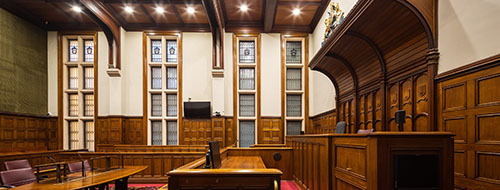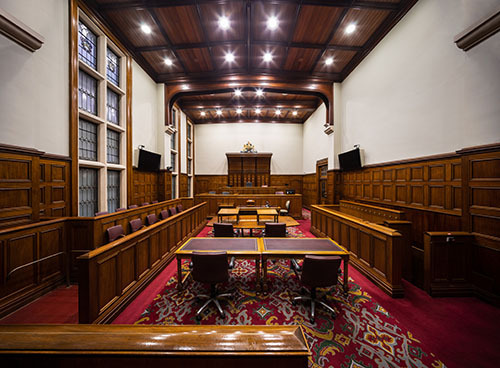- Winter 2024
- Registrars and prothonotaries of the Supreme Court of New South Wales

Based on interviews conducted by Juliette Brodsky, Media Liaison Officer, Supreme Court of New South Wales
Pursuant to the New South Wales Act 1823, 4 Geo IV c 96 (UK), letters patent establishing the Supreme Court of New South Wales were sealed on 13 October 1823 and proclaimed in Sydney on 17 May 1824. The letters patent, known as the Third Charter of Justice, also made provision for a registrar, prothonotary and ‘other officers necessary for the administration of the Court’.
The court employs 18 registrars, including senior deputy registrars and deputy registrars. Registrars are delegated power of the court by the chief justice under s 13 of the Civil Procedure Act 2005 (NSW) to undertake certain functions, including to assist judicial officers in case management. In addition to determining over 30,000 uncontested probate applications each year, registrars’ functions include:
- defended applications in relation to security for costs, discovery, interrogatories, provision of particulars, and subpoenas;
- costs disputes if the amount in question is unlikely to exceed $20,000;
- unopposed applications for the transfer of cases to or from the District and Local Courts;
- conducting examinations under various Acts, including the Corporations Act 2001 (Cth), the Proceeds of Crime Act 1987 (Cth), the Proceeds of Crime Act 2002 (Cth) and the Criminal Assets Recovery Act 1990 (NSW);
- dealing with applications for orders under many of the provisions of the Corporations Act 2001 (Cth), such as winding up of companies;
- conducting mediations under the court-annexed mediation scheme;
- hearing applications referred to them by a judge;
- providing procedural advice and determining chamber applications when sitting as the duty registrar;
- issuing court orders and writs of execution; and
- entering default judgments.[1]
On the court’s bicentenary, this article celebrates and recognises the dedication and integral role of the registrars and prothonotaries of the court, with interviews showcasing their professionalism and high-level organisational skills.
With a keen eye for detail and capacity for significant workloads, the registrars and registry staff provide essential continuity, record-keeping and infrastructure, assisting with the facilitation of the overriding purpose under s 56 of the Civil Procedure Act 2005 (NSW).

Brett Thomson, Acting Director and Assistant Principal Registrar, Prothonotary, and Admiralty Marshall
Assistant Principal Registrar Thomson commenced with the court in January 2024. Before that, he was employed for 17 years with the Crown Solicitor’s Office, including as a solicitor advocate and director of the Office’s Public Safety and Justice group.
For a short period, Assistant Principal Registrar Thomson was also an associate to the late Honourable Judge Robert (Bob) Bellear of the District Court of New South Wales, whom he describes fondly as a ‘a wonderful man’ and whose passing left a stark gap in the ranks of First Nations judges. His Honour was Australia’s inaugural First Nations judge, serving from 1996 until his death in 2005.
Assistant Principal Registrar Thomson describes acquiring considerable management experience during his time with the Crown Solicitor’s Office, saying, ‘People and management skills are crucial. Those are important support mechanisms for the work of the court. Registrars are responsible for the nuts and bolts and are often the interface between the public and the court. For a lot of members of the public, the registry and the registrars are the first point of contact. And in turn, the registry and the registrars are a point of contact with the judges. It’s an important public-facing part of the court. Registrars play a key, though not highly visible, role in the court system.
‘We can’t give legal advice to litigants. But we are here to help litigants (including self-represented litigants) navigate the process, which is not straightforward at times.’
Rebel Kenna, Acting Executive Director, Principal Registrar (CEO), and Secretary, Rule Committee
Principal Registrar Kenna has held the roles of acting executive director and principal registrar (CEO) since December 2023, before which she was the court’s first full-time female prothonotary, a role she was appointed to in 2015. Principal Registrar Kenna holds bachelor’s degrees in science and law as well as a Master of Public Administration, and she was the director and practice manager of a commercial law firm before commencing with the court.
‘When I was prothonotary, many people asked me what a prothonotary is, and I joked that I wasn’t a foot doctor,’ she laughs. ‘In all seriousness, it is an important and historical role. The prothonotary was one of the earliest delegates of judicial function, empowered to perform functions on behalf of judicial officers. The prothonotary has statutory duties, including as prosecutor in both contempt proceedings and proceedings for removal of practitioners from the local roll. The prothonotary also manages a team of registrars. In my role as principal registrar, I am now responsible for the operation of both the Supreme Court and the Industrial Relations Commission of New South Wales.’
Principal Registrar Kenna is passionate about the important role registrars play within the court system. She says that ‘registrars efficiently case manage thousands of matters annually and quickly hear and determine interlocutory applications, contributing to the just, quick and cheap workings of the court. Also, most registrars have been accredited as court-annexed mediators. In that role they assist parties in reaching resolution without the need for a final hearing. Helping parties reach common ground and settling a matter not only relieves the legal system but ensures that individual litigants can reach resolution and move on with their lives. There is a very human element to the role’.
Karen Jones, Registrar of the Court of Appeal
Registrar Jones was appointed registrar of the Court of Appeal in November 2023, previously holding the role of registrar, common law from 2019 until her current appointment. Registrar Jones holds degrees in both law and nursing and before commencing with the court in 2019, she was a partner of Wotton + Kearney. After years of quantifying insurance assessments, Registrar Jones sought a different path and has enjoyed the service-oriented aspect of the role of registrar.
Registrar Jones describes her former role of registrar, common law as voluminous and a ‘big beast’, given the breadth of the common law case management list, which includes contract law, professional indemnity, personal injury, defamation, possession, proceeds of crime and parole board review applications. During her period in that role, she conducted the common law case management list each day from 9am, after which she often presided over hearings. Communications with parties and judges took up the remainder of her time, including identifying matters appropriate to remain in a judge’s list and those appropriate for delegation to a registrar.
In her role as registrar of the Court of Appeal, Registrar Jones deals with case management and certain interlocutory applications. In addition, she continues to hear common law applications as needed. Registrar Jones describes her role as ‘not unlike directing traffic, ensuring the smooth and effective progression of matters. The registrars do all that we can to ensure applications get before judges as quickly and appropriately as possible.’
George Galanis, Registrar of the Court of Criminal Appeal
Registrar Galanis commenced with the court as registrar of the Court of Criminal Appeal in 2018. Before commencing with the court, Registrar Galanis was employed as a clerk, then practised as a solicitor and managing lawyer within the Director of Public Prosecutions’ appellate division.
In managing the call-over list for the Court of Criminal Appeal, Registrar Galanis identifies issues that need addressing, ensuring appeals are ready for hearing and that practitioners are properly informed as to appropriate next steps. ‘I ensure matters are not allocated a hearing date when not ready. I aim to ensure fairness, including by allocating hearing dates to those matters that are ready (as opposed to those that are not). I deal also with applications for access to criminal files, leave for orders to produce or to issue subpoenas, and for access orders in respect of produced material’. Registrar Galanis also manages the busy bail list, ensuring bail applications are filed with necessary material.
Registrar Galanis likens his role to that of a gatekeeper. ‘I balance parties’ needs with those of the court, ensuring court resources are used efficiently and appropriately when dispensing justice. There are numerous litigants wanting quick access to hearings. If I let in every litigant before a matter is ready, it’s just going to cause problems because those matters will not be able to be heard. A registrar holds a triaging role, ensuring the lists are at the capacity that they should be.’
Overall, Registrar Galanis says, ‘The court process can be daunting. I provide guidance where I can. I don’t perform the functions of a judge, nor do I provide legal advice. When I am asked by self-represented litigants, “What should I do? Should I make this submission? What else could I file?”, I respond in a way that complies with my own statutory functions without providing legal advice. It is important that litigants feel they have been heard. If satisfied that there was a fair process followed, and proper and transparent reasons given, generally parties are content with the outcome because they have been heard and been given reasons.’
Leonie Walton, Registrar in Equity and Corporations Registrar
Registrar Walton holds bachelor’s degrees in architecture and law. She was appointed to the court as registrar in equity in 2005, and is now registrar in equity and corporations registrar, but from time to time has been an acting registrar of the Land and Environment Court and acting prothonotary of the Supreme Court.
In her management of both the corporations list and the equity list, Registrar Walton says, ‘I see my role as ensuring that matters are properly prepared for hearing, meaning that directions are complied with and all interlocutory disputes are resolved in the most timely and efficient manner possible. I prepare for my corporations list by checking all applications in chambers before coming onto the Bench. Likewise, for the equity list I review all files and interlocutory applications in advance of the directions. It’s really a matter of understanding the legislation and rules, understanding the cases and applying common sense.’ Registrar Walton describes herself as pragmatic and takes a robust approach to case management to ensure fairness to all parties.
‘What frustrates me is practitioners failing to do the right thing and costing the client money. In my lists, I’m conscious of the impact any decision I make will have on the litigants themselves. A consideration for me is the effect on the client of any omission or act of a practitioner. This may result in orders requiring parties to take steps more quickly than they would like because of previous failures or extra time afforded if I consider that will benefit the litigation overall. I balance each party’s interests with the aim of achieving fairness. The preference is compliance with orders in the first instance.’
Jennifer Hedge, Registrar, Common Law
Registrar Hedge was appointed to the court in the role of manager, costs assessment in 2012, commencing in her current role in January 2024. Registrar Hedge has a double degree in arts and law as well as a Master of Laws and qualifications in librarianship information management. She has also been a part-time lecturer in civil procedure.
Before joining the court in 2012, Registrar Hedge was a solicitor and a law librarian with the Federal Court. For about 20 years, Registrar Hedge also held the role of registrar with the Federal Court and the Federal Magistrates Court (as it then was). Of her federal registrar roles she says, ‘I performed a wide variety of functions relating to bankruptcy, insolvency, mediations, taxations, motions – everything delegated to registrars.’
In the Supreme Court, Registrar Hedge’s functions similarly include mediations, interlocutory applications, examinations and presiding over the common law case management list as well as substantive hearings. In her case management role, Registrar Hedge ensures the parties have taken the steps they are supposed to, so that the matter is ready when it comes before the judge for hearing.
Overall, Registrar Hedge says, ‘In many years as registrar of state and federal courts, I have observed barristers and solicitors progress from junior to very senior practitioners.’ Within the court system itself, Registrar Hedge appreciates the change to computerisation and no longer having to queue to use the word processor. As well, she appreciates the enhanced climate of collaboration in court-annexed mediations, which is far greater now than it was 20 or 30 years ago when alternative dispute resolution was developing.

ENDNOTES
[1] 2023 Annual Review Supreme Court of New South Wales (Annual Review, 2023): at 18.
